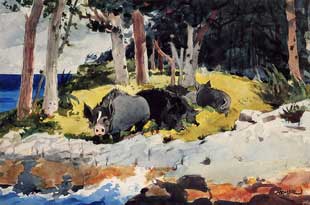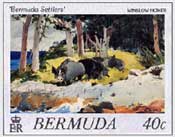United States, (1836-1910)

-
Bermuda Settlers
- (1899-1900), watercolor on paper
- 14 x 20 in. (35.6 x 53 cm.)
- Worcester Art Museum, Worcester, Massachusetts
-
Editor’s Note:
Bermuda Settlers – five wild hogs roaming a cedar grove – is Homer’s depiction of the first European “settlers” to the islands of Bermuda. Hogs were dropped in the water by 16th century Spanish and Portuguese sailors who used Bermuda as a navigational landmark when traveling to Mexico and beyond. They referred to Bermuda then as ‘Hogge Island.’
The sailors knew the hogs would swim to shore and breed – building a ready supply of food in case of emergency. The hogs became food for shipwrecks on Bermuda’s dangerous reefs as well as food for eventual British colonists.
The hogs’ importance in Bermuda was such that in 1615 a rendering of one of them was featured Bermuda’s Hog Money, the earliest Colonial coinage produced in the English speaking New World. Bermuda’s current 1 cent coin also features a hog and Homers watercolor above was featured on a Bermuda postage stamp in 1987.

Bermuda Postage Stamp
About the Artist
Winslow Homer, United States, (1836-1910). Winslow Homer was one of the finest and most influential American painters of the 19th century. He developed his own highly individual style rooted in traditional American objectivity and realism.
Homer’s artistic career began as an illustrator of magazines in the early 1850’s. He began working in oils about this same time, then in 1873, after working in oils for almost twenty years, Homer began also to paint using watercolors.
Subjects of his early career included Civil War scenes, later, his subjects usually depicted hunting and fishing, rural scenes celebrating old-fashioned rural values.Ocean scenes and the human struggle with the forces of nature were the main themes in much of this later work.
